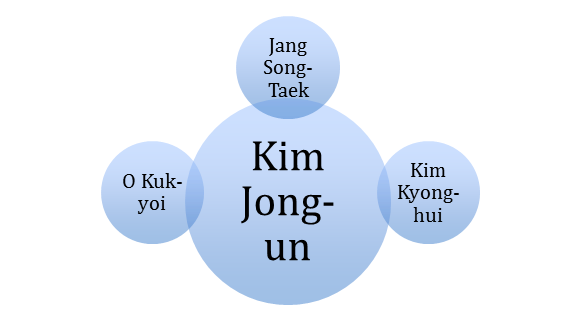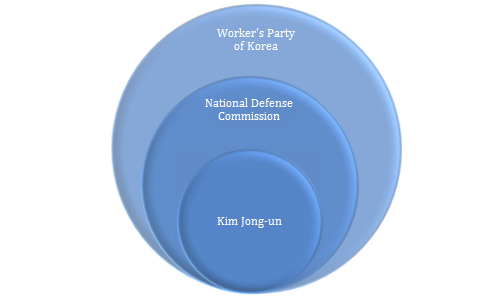The Peninsula
North Korean Decision Making Regarding Foreign Policy
Published October 26, 2012
Category: North Korea

By Nick Miller
Main Actors within North Korea Decision Making
North Korea’s political structure is a set of institutions built to sustain the Kim family. The Korean Worker’s Party (WKP) and other state agencies were designed by Kim Il-sung and Kim Jong-il to be used to play rivals off one another and assist him in consolidating elites under him. The four key powers within North Korea are as follows:
• The KWP apparatus;
• The military and security apparatus;
• The Kim family patronage system; and,
• The Kim family.
Factionalism within North Korean Politics
Kim Il-sung removed the major factors that served as direct challenges to his rule: the pro-Soviet and pro-Chinese factions in the 1950s. In 1991/1992 there was a possible coup against Kim Jong-il’s time by the Ministry of People’s Armed Forces and generals who sought to overthrow the North Korean leadership over the economic hardships that the country was experiencing.
Conservatives vs. Liberals
Over the summer of 2012 Western analysts thought the removal of Ri Yong-ho, one of the strongest defenders of the Military First policy, was a sign that there was a power struggle between the military versus reformers. Factionalism in North Korea is more focused, according to Ken Gause, on ensuring influence for the Supreme Leader, the Suryong, rather than attempting to remove him from power. The removal of Ri Yong-ho showed Pyongyang watchers that there were challenges within the North Korean elites over what direction Kim Jong-un should take the country.
Collective Leadership
North Korea is run as a one-party dictatorship run through the Suryong. As Kim Jong-un is still too inexperienced to rule a collective leadership was created to help manage North Korea with Kim Jong-un as regent.
Kim Jong-un
As Kim Jong-un is a young and untested ruler he has to rely upon the security apparatus and elites his father elevated. Kim Jong-il entrusted Jang Song-taek and Kim Kyong-hui to act as his political guardians. In Kim Jong-un’s first public speech he stated that the people did not need “tighten their belts” which is possibly a coded phrase insinuating that there will be a shift away from military-first policy. The removal of Ri Yong-ho was one of the first major signs that there was a shift occurring away from military dominance over the political process
Jang Song-taek and Kim Kyong-hui
Jang Song Taek and Kim Kyong-hui serve as the guardians for Kim Jong-un. North Korean watchers believe that Jang Song-taek is a reformer and one of the strongest supporters of Chinese style reform. He was purged in the early 2000s for his support of Kim Jong-un’s disgraced older half-brother Kim Jong-nam. Jang Song-taek has been able to re-affirm his control over North Korean politics and back into Kim Jong-il’s graces by affirming his support the regency of Kim Jong-un. Jang Song-taek trip to China in August 2012 is believed to have served as a likely preclude to Kim Jong-un first official state visit after he assumed control over North Korea. Jang is believed to be the official organizing the expansion of the state economic zones (SEZs) ventures with China.
Kim Kyung-hui is Kim Jong-il’s sister and one of his closest advisors. After the elder Kim’s death in December of 2011 she was critical in maintaining stability within North Korean regime. She was elevated to General of the KPA in 2010 despite never serving in the military, a Secretary in the Organization of the WPK, and director of the WPK Light Industry Department. As she is the daughter of Ki Il-Sung she serves as an important linchpin to the North Korean political system as it needs a Kim family member to keep the system running and the elites supporting Kim Jong-un. There have been reports of Kim Kyung-hui’s failing health due to alcohol consumption. Whether the rumors are true and what impact will it have on Jang Song-taek’s ability to initiate economic reforms remains to be seen.
O Kuk-ryol
O Kuk-ryol serves as the Vice Chairman of the National Defense Commission and his family has been supporting the Kim family since the founding of the country. General O served as Kim Jong-il’s intelligence managers and advisers. He is considered one of the more powerful figures within North Korean politics. In 2011 there were reports in The Chosun Ilbo that his protégés were purged because of the influence he held during Kim Jong-il’s reign. General O served as one of the top leaders to plan Kim Jong-il’s funeral and assisted in the succession process. He has also been identified by the U.S. government as one of the key members involved in North Korea’s counterfeiting activities. Kim Jong –un needs General O’s support because of his influence on the KPA. He could also be a counterweight, as Ken Gause contends, to Jang Song-taek and whether General O will be purged by the end of 2012 like Ri Yong-ho as Kim Jong-un removes further old guard members remains a possibility.
Kim Jong-un’s Collective Leadership
Government Agencies
Worker’s Party of Korea (WKP)
The National Party Congress is the supreme party organ and approves the reports for the party organs, adopts party policy and tactics, and elects members to the KWP Central Committee and Central Auditing Committee. When the National Party Congress is not in session the Central Committee acts as the official agent of the Party. The Central Committee meets once every six months and is responsible for the election of the Party General Secretary, members of the Politburo, the Politburo Standing Committee, and Central Military Commission. Kim Jong-Il shifted power away from KWP towards the Korean People’s Army (KPA) with the military-first policy. The military took over numerous positions within Politburo and Secretariat and WKP influence was significantly weakened during Kim Jong-il’s reign.
National Defense Commission (NDC)
The NDC houses the elites that hold influence within North Korean politics. Officials within the NDC also have leadership roles within Ministry of Peoples Armed Forces, KWP, and intelligence and security agencies. The NDC membership is comprised of ten individuals of which eight hold military rank. The military members of the NDC are also members of the Central Military Commission. This concentration of elites across agencies allowed Kim Jong-il to main control over the government and flow of information.
Kim Jong-il elevated the NDC in 1998 to serve as a powerful power-holding group and expanded his Military-First doctrine that gave enormous influence to the KPA. Under Kim Il-sung the armed forces was controlled via the KWP but after the power restructuring Kim Jong-Il ensured he had direct control over the military and had a forum to discuss and manage the pressing issues facing the country.
DPRK Power Structure that Shapes Foreign Policy
Central Military Committee (CMC)
This is the highest-level KWP organization that is involved directly with shaping military policy. The CMC leaders also hold positions within NDC and headed by Kim Jong-il till his death in 2011. After restructuring the CMC’s influence over the direction of military policy became negligible. While in some ways its role over the military has lessened it still holds some important sway over coordinating the party line on military policy with the Central Committee. The CMC facilitates the KWP role in managing defense responsibilities especially over military procurements.
Korean People’s Army (KPA)
In order to control the direction of North Korean politics one must have the loyalty of the military. During Kim Jong-il’s reign the Military-First policy elevated the influence of the military on North Korean politics. The KPA holds some of the strongest influence on North Korean politics today. It is also the only group that could in theory challenge the rule of Kim family, if they desired to do so. The military has over 1.1 million troops and consumes over 15.5% of the nation’s GDP.
Nick Miller received his M.A. in International Relations from Flinders University, Australia. He writes on Chinese-North Korean issues at sinonk.com.
Photo from Radio Nederland Wereldomroep’s photostream on flickr Creative Commons.

